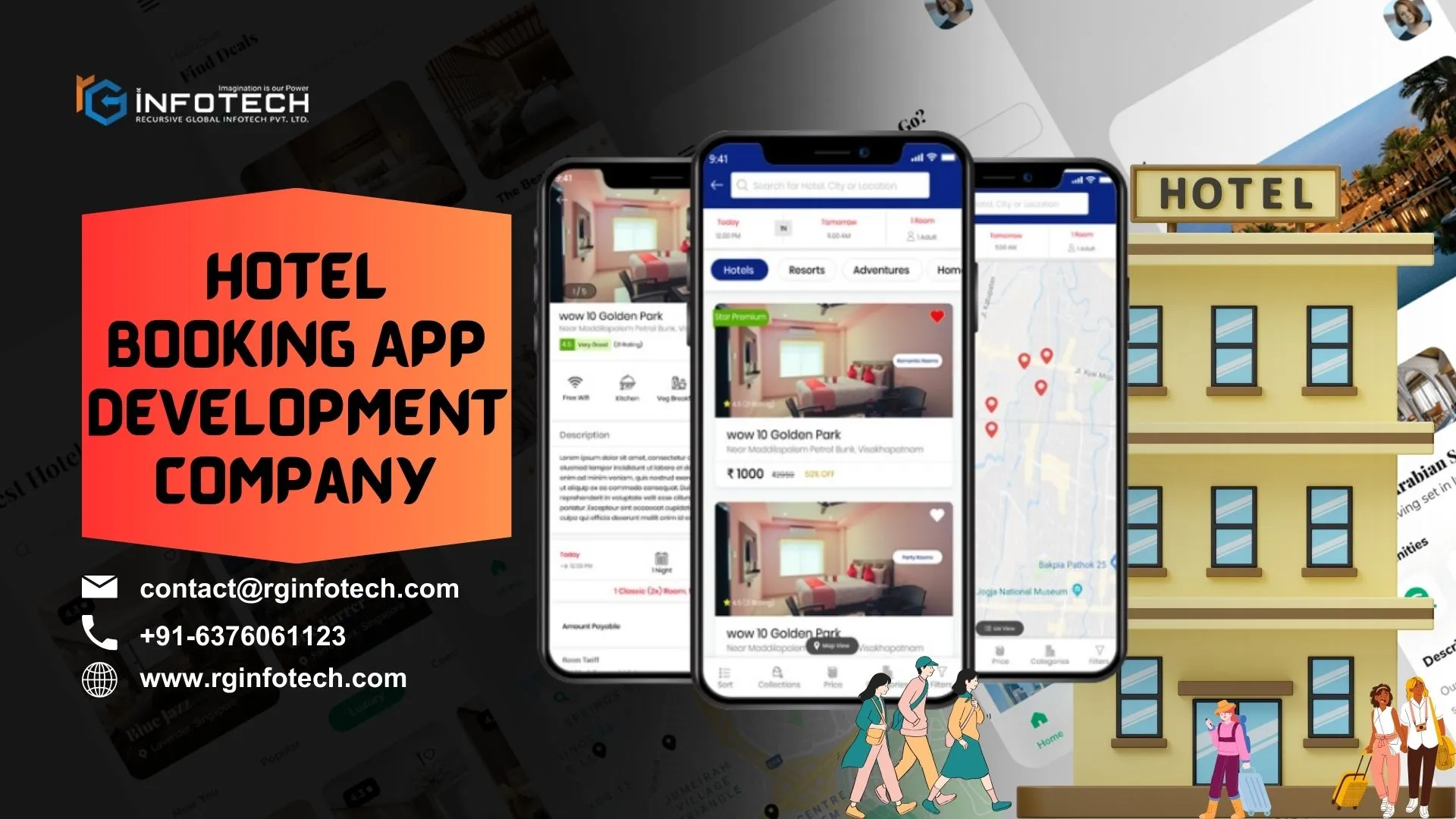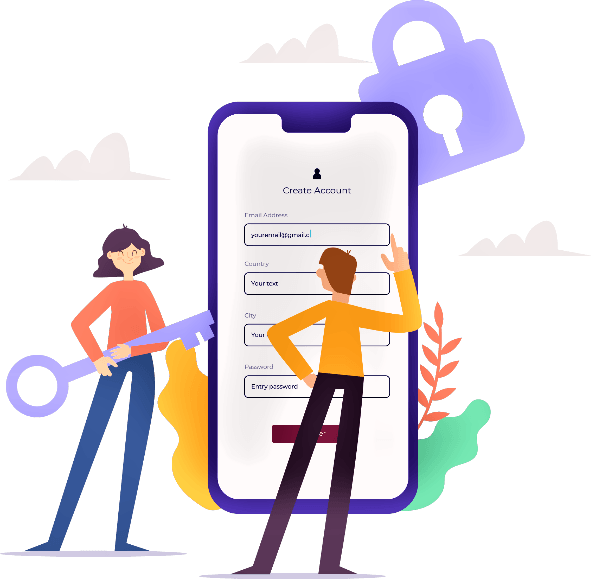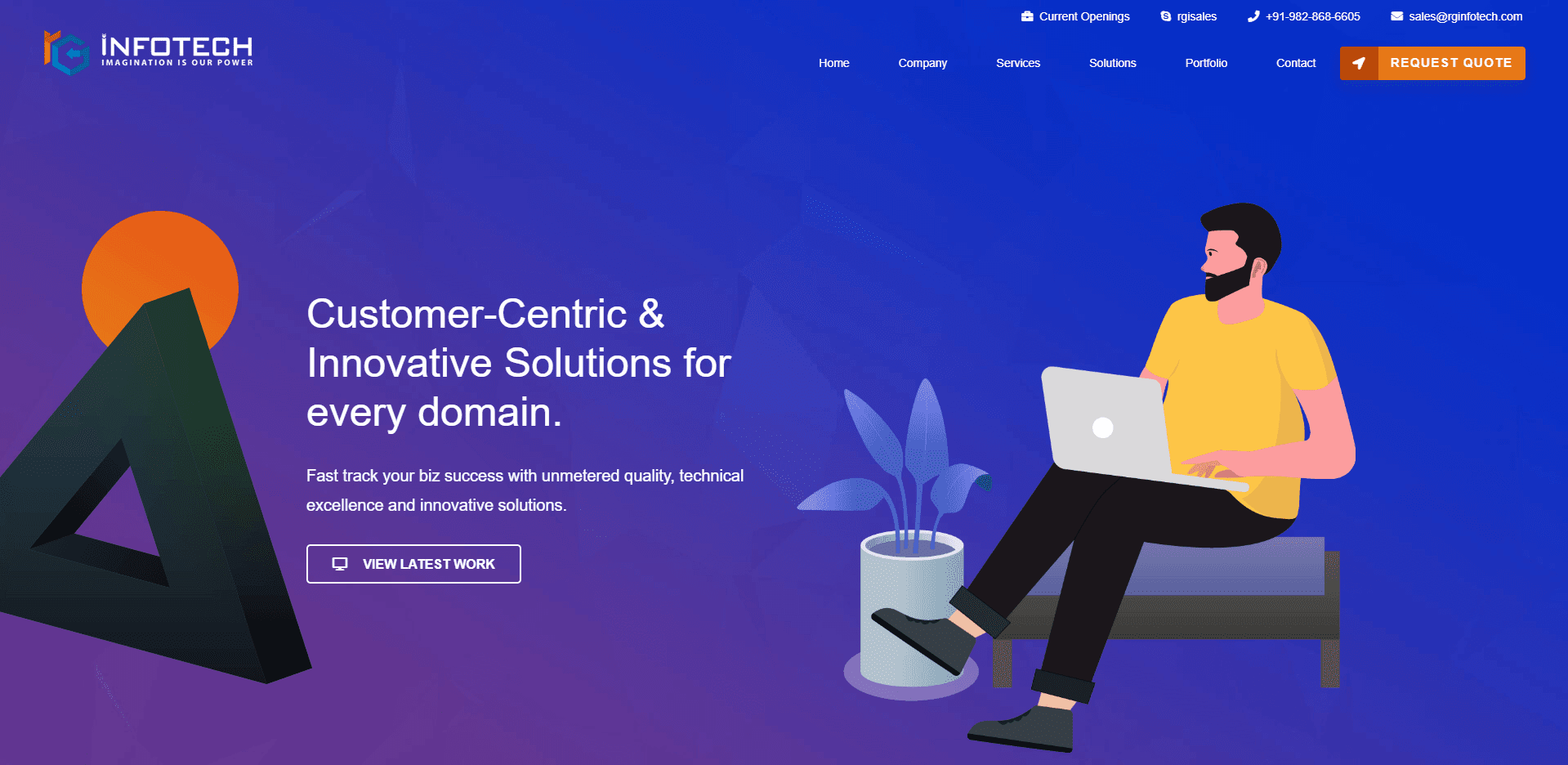How to Develop A Hotel Booking App? Types, Features, Business Models, Factors, Providers and Cost Estimation

Advance hotel bookings have significantly enhanced customer comfort and provided a seamless travel experience. Leading hotel booking app development companies play a crucial role in empowering restaurants and hotels to manage their bookings more efficiently. Mobile applications are the most prominent of the ongoing digital evolution, delivering hassle-free services to travelers. Around 70% of people use their smartphones to search for hotels and lounges in prime locations; the demand for convenient and cross-platform booking solutions is rising.
Surveys disclose that travelers from all around the globe are embracing new technologies to simplify their search processes. By offering a user-friendly app, businesses can capitalize and make stronger bonds with customers. This offers customers the convenience of booking hotel rooms or dining reservations in advance, according to their specific preferences and requirements.
What Are Hotel Booking Apps?
Hotel booking applications are digital tools that transform the way travelers book accommodations at hotels, lounges, or restaurants. These apps are designed specially to simplify the process of reserving accommodations, ensuring users an effortless and smooth search and comparison of hotels and accessing comprehensive details about each option. And complete bookings directly from their smartphones or computers. By incorporating important features and functionalities with robust security features, developers can create a hotel booking app that more conveniently and efficiently manages travel plans and ensures a comfortable stay.
What Types of Hotel Booking Apps Are There?
Knowing which type of online hotel booking application you should build is necessary if you want to make a hotel booking app. You must have a distinct idea of what you can provide consumers and what hotel booking app features you would like to include in your app. Some of the basic categories of hotel booking apps are:
Hotel Chain Apps
Hotel chain applications are designed for specific hotel brands, providing a streamlined-looking experience through the chain’s platform. Users can explore various hotels within the chain, view detailed information about amenities and room options, and make reservations directly. These applications frequently include brand-specific loyalty programs, providing rewards and exclusive deals to enhance the guest experience and encourage frequent and repeat bookings.
Vacation Rental Applications
Any top hotel booking app development company develops vacation rental applications according to the preferences of travelers searching for short-term stays in properties such as homes, apartments, or unique accommodations. These apps often offer more affordable options compared to traditional hotels, with detailed listings that include property features, piercings, and availability. Users can book their stays directly through the platform and often receive recommendations for local experiences and attractions. Airbnb is a prominent example of this category, reaching $9.917 billion in service revenue in 2023, showcasing its significant impact on the vacation rental market.
OTA (Online Travel Agency) Apps
OTA (Online Travel Agency) apps provide a one-stop solution for booking a wide range of travel services, including flights, hotels, and car rentals. And vacation packages. These platforms aggregate data from various providers, allowing users to search for and compare options easily. Users can manage their bookings, access special deals, and read reviews directly through the app. With an integrated payment system and itinerary management, OTA apps streamline the travel planning process, making it convenient to organize and book all aspects of a trip from a single interface.
Last Minute Booking Apps
Last-minute booking apps are crafted for travelers who require accommodations with minimal advance notice (for example, the Flutter flight booking app). These apps prioritize real-time availability and offer special discounts to attract spontaneous travelers. They provide a quick and efficient way to secure last-minute bookings, making them ideal for those with flexible or unexpected travel plans. Notable examples in this category include HotelTonight.com and Hotels.com.
Hybrid Hotel Booking Apps
Hybrid hotel booking apps merge the functionalities of traditional hotel booking platforms with those of vacation rental services. These apps provide users with a diverse selection of accommodation options, including hotels and vacation rentals. By integrating features from both types of platforms, hybrid apps allow users to compare prices, amenities, and availability across a broad spectrum of options. This approach offers a versatile booking experience, enabling users to find and reserve various types of stays from a single, unified app.
Metasearch Apps
Metasearch apps compile and display hotel information from various booking sites, allowing users to compare prices, availability, and options across multiple platforms. By aggregating data from different sources, these apps provide a comprehensive overview of available accommodations and help users identify the best deals. Once users select their preferred option, the app directs them to the respective booking site to complete the reservation. This model streamlines the search process, making it easier for users to find and secure the best rates and accommodations.
What are the Features of Hotel Booking Apps?
Here are detailed descriptions of key features in hotel booking apps:
Advanced Search Filters
Advanced search filters allow users to narrow down their search results based on specific criteria such as price range, location, star rating, and amenities. This feature enables users to quickly and efficiently find accommodations that match their preferences and requirements.
Booking and Cancellation
The booking and cancellation feature lets users reserve rooms directly through the app and manage their bookings, including making changes or cancellations. This functionality provides flexibility and convenience, ensuring users can handle their reservations with ease.
Accommodation Booking Screen
The accommodation booking screen presents users with available rooms and options for selecting dates, room types, and preferences. It offers a user-friendly interface that facilitates the booking process, making it simple for users to complete their reservations.
Accommodation Details Screen
The accommodation details screen provides in-depth information about each property, including photos, descriptions, amenities, and user reviews. This feature helps users make informed decisions by offering comprehensive insights into what each property has to offer.
Customer Account
The customer account feature allows users to create and manage their profiles, view booking history, and store payment information. This personalisation enhances the user experience by providing easy access to past reservations and simplifying future bookings.
Hotel Account
The hotel account feature enables property managers to update details about their accommodations, manage bookings, and access analytics. This tool streamlines property management and supports operational efficiency by providing essential administrative functions.
Different Payment Channels
Support for different payment channels allows users to choose from various payment methods, including credit/debit cards, digital wallets, and bank transfers. This feature caters to diverse payment preferences and enhances convenience for users.
Real-Time Availability
Real-time availability displays current information on room availability and rates, ensuring users have accurate and up-to-date details when making reservations. This feature helps avoid booking errors and ensures users can secure their preferred accommodations.
GPS Integration
GPS integration uses location data to help users find hotels based on their current location or desired destination. This feature makes it easier for users to search for nearby accommodations and get directions to their chosen property.
In-App Navigation
In-app navigation provides maps and directions to guide users to their booked accommodations. This feature enhances convenience by offering turn-by-turn directions and helping users navigate to their destinations seamlessly.
Virtual Tour
The virtual tour feature allows users to explore hotel rooms and facilities through 360-degree photos or videos. This immersive experience helps users get a better sense of the property before making a booking, enhancing their confidence in their choice.
Loyalty Programs
Loyalty programs integrate with hotel rewards systems to offer benefits such as points, discounts, or special perks to repeat customers. This feature encourages customer retention and builds brand loyalty by rewarding frequent guests.
Multiple Language Support
Multiple language support provides app interfaces and customer support in various languages. This feature improves accessibility for users from different linguistic backgrounds, making the app more user-friendly and inclusive.
CRM Integration
CRM integration connects the app with Customer Relationship Management systems to manage interactions and data. This feature helps enhance customer service, track user preferences, and enable personalized marketing strategies, improving the overall user experience.
Business Models for Hotel App Development
Here are some of the most used business models for hotel app development:
Aggregator Model
The aggregator model focuses on consolidating hotel information from multiple sources, allowing users to compare rates, availability, and reviews across various platforms. Users can view a comprehensive list of options in one place, simplifying their decision-making process. Revenue is primarily generated through commissions on bookings made via the app and referral fees from hotels or OTAs for directing traffic to their sites. Popular examples include Trivago and Kayak.
Advertising Model
In the advertising model, hotel booking apps are offered free to users, with revenue coming from advertisements placed within the app. Hotels, travel agencies, and related businesses pay for ad placements, which can include banners, sponsored listings, or promotional content. This model relies on high user engagement to attract advertisers and generate income through cost-per-click (CPC) or cost-per-impression (CPM) charges. Examples of apps using this model include Booking.com and Hotels.com.
Subscription Model
The subscription model involves charging users a recurring fee to access premium features or services within the app. This may include benefits such as exclusive discounts, advanced search filters, or an ad-free experience. Revenue is generated from regular subscription payments, with some apps offering tiered pricing levels for different features. This best hotel booking app development model provides a steady revenue stream and added value to frequent users, though it is less common in mainstream hotel booking apps.
Dedicated Model
The dedicated model is tailored specifically for a single hotel brand or chain, offering a branded booking experience and integrating the brand’s loyalty programs and exclusive offers. Revenue is generated from direct bookings made through the app, often enhanced by brand-specific promotions and rewards. This model helps hotel brands strengthen customer loyalty and streamline their booking process. Examples include the Marriott Bonvoy app and the Hilton HHonors app.
Merchant Model
In the merchant model, the app acts as an intermediary by purchasing room inventory from hotels at discounted rates and selling it to users at retail prices. The app profits from the markup between the wholesale and retail prices. This model requires robust relationships with hotels and efficient inventory management to ensure availability and competitive pricing. Priceline and Hotwire are notable examples of this model.
White Label Model
The white label model provides a customisable booking platform that a hotel booking app development company or other businesses can rebrand and use as their own. This model is popular among hotel chains, travel agencies, and hotel management groups seeking a personalized booking solution without developing technology from scratch. Revenue comes from licensing fees for the platform and additional customisation charges. Companies like Guestline and RoomRaccoon offer white-label booking solutions.
Factors to Consider While Looking for A Hotel Booking App Development Company
When selecting a hotel booking app development company, it’s important to ensure they have the right combination of experience, technical expertise, and the ability to deliver a customized solution. Here are the key factors to consider, along with the frameworks they should be proficient in:
Experience and Portfolio
When selecting a hotel booking app development company, it’s essential to consider their experience and portfolio to ensure they can deliver a high-quality, customized solution. Look for a company with a proven track record in developing similar apps and a diverse portfolio showcasing their capabilities. This experience demonstrates their ability to handle complex requirements and deliver functional, user-friendly applications. Evaluate their past projects to assess the quality of their work and their ability to meet client expectations, ensuring they are well-equipped to bring your vision to life effectively.
Technology Stack and Frameworks
When choosing a company for a hotel booking app, evaluating their technology stack and frameworks is crucial. Here’s what to consider:
- Front End: The company should be proficient in frameworks like React Native for apps like React Native hotel booking apps, cross-platform mobile applications, Flutter for customisable and high-performance UIs, Angular for dynamic and scalable web apps, and Vue.js for flexible and lightweight web interfaces.
- Back End: Look for expertise in Node.js for scalable server-side applications, Django for secure and feature-rich on-demand hotel booking app development, Ruby on Rails for rapid development with convention over configuration, and Spring Boot for robust enterprise-level Java applications.
- Database Integration: Ensure they have experience with MySQL or PostgreSQL for reliable relational databases, MongoDB for flexible NoSQL databases, and Firebase for real-time data and user authentication.
- API Integration: They should be skilled in RESTful APIs for standard web service communication, GraphQL for efficient data querying, and integrating third-party APIs for enhanced functionality like payment gateways and mapping services.
Customisation and Flexibility
The company that develops a hotel booking app should be adept at creating tailored solutions that meet your specific requirements and adapt to evolving needs. They should offer flexibility in design and functionality, ensuring that the app can be customized to align with your brand and business goals.
Security Measures
Evaluate their approach to security, including data protection practices, encryption protocols, and compliance with industry standards. The on-demand hotel booking app development company should implement robust security measures to safeguard user data and ensure the app’s integrity.
Communication and Project Management
Effective communication and project management are crucial for a successful development process. The company should offer clear and consistent communication, provide regular updates, and manage the project efficiently to meet deadlines and budget constraints. Their ability to address concerns and incorporate feedback promptly will significantly impact the project’s success.
Top 5 Hotel Booking App Development Providers
Here we present the top 5 hotel booking app development providers known for their expertise in creating robust and user-friendly applications:
- RG Infotech: RG Infotech delivers tailored hotel booking app development solutions that emphasize seamless user interfaces, secure payment gateways, and real-time booking features. They focus on integrating advanced technologies like AI and machine learning to enhance user engagement.
- Tecocraft: This amazing company excels in building scalable hotel booking apps that offer features like in-app navigation, virtual tours, and multiple payment options. Their development approach ensures high performance across different devices, providing a smooth user experience.
- Vrinsoft Technology Pvt Ltd: Vrinsoft offers end-to-end hotel booking app development services, from UI/UX design to back-end integration. They are known for incorporating innovative features such as GPS integration and real-time availability, making the booking process convenient for users.
- TATA Consultancy Services (TCS): It is a global IT services giant that provides comprehensive hotel booking app solutions for large enterprises. They offer advanced features like CRM integration, loyalty programs, and multi-language support, catering to a global audience.
- Moon Technolabs: This company specializes in creating high-performance mobile apps, including hotel booking apps that prioritize user experience. Their apps are designed to handle large volumes of data and offer features like advanced search filters, booking and cancellation management, and secure transactions.
What is The Cost of Developing A Hotel Booking App?
The hotel booking app development cost is influenced by multiple factors, making it essential to understand how each contributes to the final price. Beyond just the starting range of $20,000 to $90,000. The specifics of your project—such as the app’s features, the user interface design, and the integration of advanced technologies like AI or machine learning—can drive costs up or down.
The location and experience of the development team are also important factors. For example, hiring developers from North America or Europe can be much more expensive than choosing experts from India or Southeast Asia, where development costs are typically lower but the quality of work is still very high.
The hotel booking website development cost is also influenced by the tech stack, which includes the selected front-end and back-end technologies, and the development platform, with more advanced tools and platforms possibly requiring a greater budget. You can choose to build for iOS, Android, or both. You can make planning and budgeting for your hotel booking app development project easier by being aware of these subtleties.
Country
Price/Hour
U.S.A
$150-$200
India
$25-$40
Ukraine
$25-$50
U.K
$50-$100
Conclusion
In conclusion, the development of hotel booking apps is essential in today’s digital age, offering unparalleled convenience and efficiency for both travelers and hospitality providers. By partnering with a skilled hotel booking app development company, businesses can create innovative, user-friendly applications that cater to the evolving needs of modern travelers. Stay tuned for more informative updates.
Frequently Asked Questions (FAQs)
Hotel booking apps connect users with a database of hotels and other accommodations. Users can search for hotels based on location, price, amenities, and other filters. Once they find a suitable option, they can book a room directly through the app, often with integrated payment options.
Using a hotel booking app offers several benefits, including the convenience of booking from anywhere, access to real-time availability and pricing, the ability to compare multiple options, special deals or discounts, and the ease of managing reservations in one place.
Most hotel booking apps allow users to cancel or modify their bookings directly through the app, often up until a certain time before the check-in date. However, cancellation policies may vary depending on the hotel or booking platform.
There are several types of hotel booking apps, including hotel chain apps, vacation rental apps, OTA (online travel agency) apps, last-minute booking apps, and hybrid apps that combine features from various booking platforms.



 rgisales
rgisales



